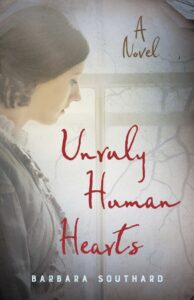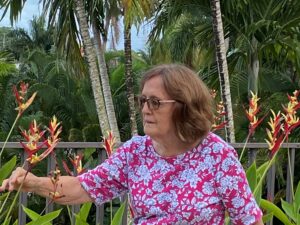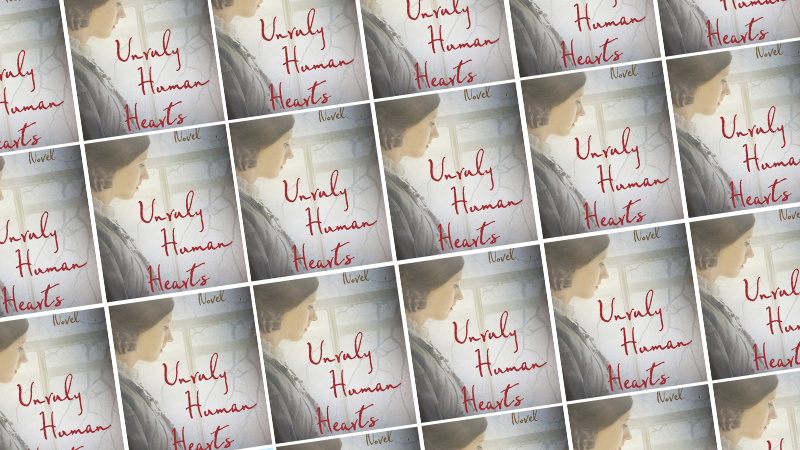Southard gives female-centric perspective on Beecher-Tilton adultery trial
 BROOKLYN, NY – Lust, infidelity, and betrayal centered the historically famous Beecher-Tilton adultery trial where Theodore Tilton, his wife Elizabeth Tilton, and Reverend Henry Ward Beecher are exposed for their extramarital affairs, embodying the new 19th century concept of “free love.” In her historical fiction debut, “Unruly Human Hearts” (She Writes Press, January 28, 2025), debut author Barbara Southard brings life to the one voice unheard throughout the infamous case–the adulteress herself.
BROOKLYN, NY – Lust, infidelity, and betrayal centered the historically famous Beecher-Tilton adultery trial where Theodore Tilton, his wife Elizabeth Tilton, and Reverend Henry Ward Beecher are exposed for their extramarital affairs, embodying the new 19th century concept of “free love.” In her historical fiction debut, “Unruly Human Hearts” (She Writes Press, January 28, 2025), debut author Barbara Southard brings life to the one voice unheard throughout the infamous case–the adulteress herself.
During the Reconstruction era, the Beecher-Tilton adultery trial made headlines and shocked the nation. Elizabeth Tilton, the woman at the center of it all, is often portrayed as a passive victim of the scandal, but Barbara Southard proposes a different story–one where Elizabeth is the author of her own life. Using her skills as a historian, Barbara Southard’s emotional novel explores the impact that sexual revolutions have had on women, the challenge of upholding personal convictions in private life, and the power of finding your voice in a world that wants you to be silent.
Elizabeth Tilton, Theodore Tilton, and Reverend Henry Ward Beecher were 19th-century reformers who embraced liberal ideas, including “free love.” When Theodore confessed to an extramarital affair, Elizabeth expressed her feelings for Beecher, entangling them in a complicated love triangle marked by desire, jealousy, and the fear of public scandal. As Elizabeth’s passion for Beecher tested the moral boundaries of her time, she faced difficult choices that could cost her everything. In a society ready to condemn the slightest deviation from the strict code governing female behavior, she struggled to find her voice and define her own truth.
 More about Barbara Southard: Barbara grew up in New York City, holds a PhD in history from the University of Hawaii, and has served as a professor of history, Chairperson of the History Department, and Associate Dean of Graduate Studies at the Río Piedras Campus of the University of Puerto Rico.
More about Barbara Southard: Barbara grew up in New York City, holds a PhD in history from the University of Hawaii, and has served as a professor of history, Chairperson of the History Department, and Associate Dean of Graduate Studies at the Río Piedras Campus of the University of Puerto Rico.
She is the author of a book on Indian history, The Women’s Movement and Colonial Politics in Bengal, 1921–1936, and has also published numerous articles in history journals. Barbara has also published short stories in literary journals, and she is the author of The Pinch of the Crab, a collection of ten stories set in Puerto Rico, exploring social conflicts of island life, mostly from the female perspective.
Barbara has also been active in raising funds for the Shonali Choudhury Fund of the Community Foundation of Puerto Rico, helping local community organizations working to protect women from domestic violence. She does this work in honor of her daughter, a public health professor who died of a brain tumor. You can find more information about Barbara on her website:https://www.barbarasouthard.com/.
Follow her on Instagram @barbara.southard45
Find her on Facebook https://www.facebook.com/BarbaraSouthardAuthor
Advanced Praise for Unruly Human Hearts
“In Unruly Human Hearts, Barbara Southard has created a delightful and poignant novel about the Beecher-Tilton scandal in the Reconstruction Era. Focusing on Elizabeth’s internal struggle to cope with her husband’s public support for women’s rights while maintaining the double standard in private, this story will inspire readers to ask themselves how women should confront similar challenges today. Perfect for fans of well-researched and engaging historical fiction!”
— Jacqueline Friedland, author of The Stockwell Letters and Trouble the Water
“This is not just the story of a woman who tried to be a good Christian wife while passionately in love with her pastor, it’s a revelation of her anguish as she struggled to protect herself, her children, and the two men she loved from the toll of escalating public scandal.”
– Linda Ulleseit, author of The River Remembers and Innocents at Home
“In Unruly Human Hearts, Barbara Southard masterfully unravels the poignant story of Elizabeth Tilton, ensnared in a scandalous love triangle of the 1870s. Rich with period detail and emotional depth, Southard’s flawless reimagining brings to life a time when a woman’s desires and concerns were considered a fault. Elizabeth’s journey of resilience and self-discovery amidst societal constraints is both heart-wrenching and inspiring. As she bears the weight of public scrutiny, she delivers a timely message on the restorative power of honesty. With an eye for historical accuracy and a gift for heartfelt storytelling, Barbara illuminates the struggle of a courageous woman ahead of her time, whose fight for dignity and understanding serves as a stark reminder that the quest for gender equality and freedom remains as an ongoing challenge.”
– Elba Iris Pérez, author of The Things We Didn’t Know
“Unruly Human Hearts”
Barbara Southard | January 28, 2025 | She Writes Press | Historical Fiction
Print | 978-1-64742-830-3 | $17.99
Ebook | 978-1-64742-831-0 | $12.99
In an interview, Barbara can discuss:
- How her experiences with the women’s liberation movement of the 1960’s and ’70’s shaped her interest in Elizabeth Tilton
- How her interactions with students in a graduate course on US social history shaped her interest in the Beecher-Tilton scandal.
- Why the events of the book are still relevant today, especially with the modern concept of polyamory and nonmonogamy
- Why she chose to write the novel from the perspective of Elizabeth Tilton instead of her two lovers, who were both prominent figures of the day
- How the characters in her novel reconcile the doctrine of “free love” with their religious beliefs
- Her career as a historian, especially as it pertains to how she has highlighted women’s struggles in both the United States and India
An Interview with Barbara Southard
1. How did your experiences with the women’s liberation movement in the 1960’s and 1970’s shape your interest in Elizabeth Tilton?
I was a schoolgirl when the conservative culture of the 1950s promoted the ideal of women as homebodies whose sole mission in life was to be a wife and mother. The women’s liberation movement and the sexual revolution of the 1960s and 1970s profoundly affected my journey to adulthood. Reading about the role of free love (the nineteenth century version of open marriage) in Elizabeth Tilton’s life propelled me to investigate the challenges she faced in an epoch even more profoundly sexist.
2. How did the views expressed by students in a graduate seminar you taught on the social history of the United States influence your decision to explore the Beecher-Tilton scandal more deeply?
I remember telling my students in a graduate course on US social history at the University of Puerto Rico that the Beecher-Tilton trial caused as much sensation in 1875 as the impeachment of President Bill Clinton in 1998 for alleged breaches of the law connected with the attempted cover-up of sexual intimacies with Monica Lewinsky. These discussions with students inspired me to delve more deeply into historical sources in the hope of illuminating Elizabeth’s motivations and the unique challenges that she faced as a woman involved in the greatest sex scandal of the epoch.
3. Why did you choose to write the novel from Elizabeth Tilton’s perspective, as opposed to that of her two lovers?
Elizabeth’s feelings and motivations were a greater mystery than those of her two lovers. How did she come to believe in free love? Once the scandal broke, how did she cope with the danger of losing everything, her reputation, her marriage, her children?
4. Tell us more about your career as a historian and your work to highlight women’s struggles in both the United States and India.
During my teaching career at the University of Puerto Rico, I created graduate seminars on women’s history in India and the United States. In the first chapter of my book about the emergence of the women’s movement in India, I explored the religious and social reform movements that were a prelude to the demand for women’s rights. When teaching courses about women in the United States, I noted that challenges to Calvinist beliefs were connected to movements to improve the position of women.
5. Do you feel that the issues posed in “Unruly Human Hearts” are still relevant today, especially in conversation with the modern concept of polyamory?
Elizabeth’s story is still relevant to issues of individual freedom and social ethics as well as the position of women today. The sexual revolution in the 1960s and 1970s raised questions about whether free love (or open marriage) is liberating for women. It’s difficult for women who are economically dependent on men to insist that men grant their partners the sexual freedom they claim for themselves. Although women have made progress toward economic independence, a gap remains. Hopefully, future progress toward gender equality will make it less likely that women who practice polyamory will undergo the heartbreak Elizabeth experienced.
Download press kit and photos

A former award-winning journalist with national exposure, Marissa now oversees the day-to-day operation of the Books Forward author branding and book marketing firm, along with our indie publishing support sister company Books Fluent.
Born and bred in Louisiana, currently living in New Orleans, she has lived and developed a strong base for our company and authors in Chicago and Nashville. Her journalism work has appeared in USA Today, National Geographic and other major publications. She is now interviewed by media on best practices for book marketing.


